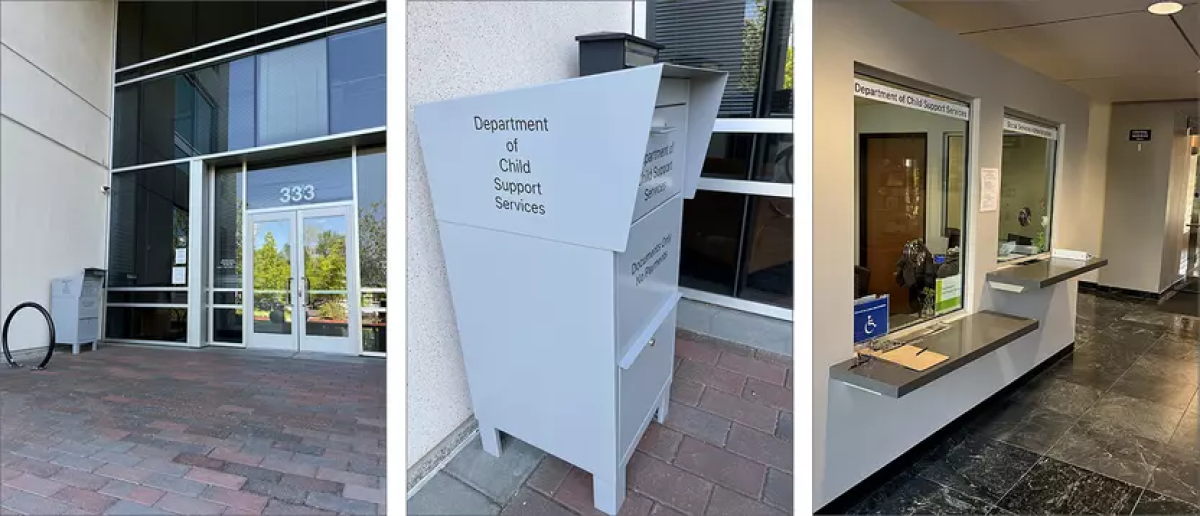Child Support
Get Off My Dime
How to File a Declaration of Financial Need in Family Court

Can’t afford a lawyer in family court? California law lets you ask the judge to make your ex pay your attorney’s fees. This guide shows how to file the right forms, write a strong declaration, and includes a free template to help you get started.
Let’s be real: family court isn’t exactly built for people without money. And if you’re the lower-income parent, trying to represent yourself while your ex has an attorney? That’s not a fair fight. But California law actually gives you a way to level the playing field — by asking the court to make the other parent pay your attorney’s fees.
It’s called a Declaration of Financial Need for Attorney's Fees and Costs, and it’s not just paperwork — it’s your chance to explain to the judge why you need help, and why your ex should be the one footing the legal bill.
This post breaks it down: what the law says, what the court looks for, how to write the declaration, and how to file it properly. I’ll also give you a free template you can use to generate your own declaration — court-ready and customized.
Why the Court Might Make the Other Parent Pay Your Legal Fees
Under California law, the court’s job isn’t just to referee — it’s supposed to make sure both sides have a fair shot at presenting their case. That includes legal representation. If one parent can afford a lawyer and the other can’t, the court can order the higher-earning parent to pay all or part of the other parent’s attorney’s fees.
This isn’t a punishment. It’s not about who’s the “bad guy.” It’s about access to justice — specifically under Family Code §§ 2030–2032 for Nullity, Dissolution, and Legal Separation but also in regards to Child and Spousal Support in California Family Code §§ 3557. These laws say that if there’s a big difference in income or access to funds, and one side needs legal help, the court must consider making an attorney’s fee order.
Judges don’t always grant it, but they are required to look at:
- The income and needs of each parent
- Whether one party can afford to pay for legal help for both
- Whether the request is reasonable and necessary to ensure fairness
If you're struggling to keep up and your ex is lawyering up with ease, this is your legal tool to push back.
When and Where This Comes Up
You don’t have to wait for a trial to ask for attorney’s fees — and honestly, you shouldn’t. A request like this usually shows up early in the case, often when you’re responding to or filing your first major motion. Think: custody, child support, visitation, or anything else that might spark a fight.
Common situations where you’ll make this request:
- When filing a Request for Order (FL-300)
- When responding to one of their motions and you need legal help
- When the income difference becomes obvious
- Before trial, especially if your ex is increasing costs through delay
Important: the judge won’t just offer this. You have to formally request it with the right supporting forms.
How to Prepare Your Declaration (and Where It Fits in the Forms)
Your request for attorney’s fees goes into a Request for Order packet. That means completing Form FL-300 and attaching several key documents.
Full Packet Includes:
- FL-300 – Request for Order: The main form; check the “Attorney’s fees and costs” box
- FL-319 – Request for Attorney’s Fees and Costs Attachment: States legal basis (Family Code §§ 2030–2032)
- FL-150 – Income and Expense Declaration: Required under FL-319, Section 5a
- FL-158 – Supporting Declaration: Required under FL-319, Section 5b; includes Section 3c
- FL-157 – Spousal or Domestic Partner Support Declaration Attachment: Required only if you are or were married or in a registered domestic partnership with the other party, as explained in FL-158, Section 6
Section 3c of FL-158 lets you check a box and attach a full written declaration. That’s where your custom declaration goes — labeled Attachment 3c – Declaration of Financial Need.
In that custom declaration, you explain:
- Why you need an attorney
- Why you can’t afford one
- Why it’s reasonable for your ex to contribute
- How your financial disparity affects your ability to participate fairly
It should be factual, calm, and persuasive. Don’t rant — just lay out your situation and back it up with numbers and any supporting context.
If you were married or in a domestic partnership with the person you're requesting fees from, FL-158 also requires that the court consider factors under Family Code §4320 (lists the factors a court must consider regarding the award of spousal support). That means you must include either:
- Form FL-157, or
- A custom declaration labeled "Attachment 6 to FL-158" that walks through the §4320 factors (length of marriage, earning capacity, standard of living, etc.). So that you hit all the requirements, we strongly recommend filing out FL-157 if you are/were married.
If you were never married or in a registered domestic partnership with the other parent, you can skip FL-157.
Here is a table that explains when FL-157 is required and what statute is invoked for the attorney's fees and costs request. For reference: §2030 (custody/divorce matters), §3557 (child support), §4320 (spousal support)
| Relationship to Other Parent | Legal Issue | Statute Invoked | FL-157 Required? | Why |
|---|---|---|---|---|
| Married/domestic partners | Divorce/separation | §2030 | ✓ Yes | Required by FL-158 (4320 factors) |
| Married/domestic partners | Post-judgment child support | §2030 or §3557 | ✓ Yes | Still considered related to dissolution — triggers 4320 |
| Married/domestic partners | Custody only | §2030 | ✓ Yes | Any fee request between former spouses triggers FL-158 §6 |
| Never married | Child support | §3557 | ✕ No | §4320 not required — FL-157 not needed |
| Never married | Custody only | §2030 | ✕ No | FL-158 Section 6 doesn’t apply |
And here's our simplified table based on the issue and statutes.
| Legal Issue | Fee Statute | Notes |
|---|---|---|
| Custody/visitation | §2030–§2032 | Always use this — regardless of marital status |
| Spousal support | §2030–§2032 | Triggers §4320 analysis |
| Child support | §3557 (also can use §2030) | §3557 is tailored to child support enforcement |
| Paternity case w/ custody | §2030 | Same as above; §2030 governs fee awards |
Use Our Free Template to Create Your Declaration
FL-158 gives you a checkbox for “Attachment 3c.” That’s where your personal declaration goes — the part that tells the judge, in plain English, why you need this help.
Sample Declaration
Attachment 3c to FL-158 – Supporting Declaration for Attorney’s Fees and Costs Declaration of Financial Need for Attorney’s Fees Name: Angela [Last Name] Case No.: [Insert if known] County: [Insert Superior Court County] Related Matter: Enforcement of existing child support order 1. Income and Financial Status Monthly Gross Income: $2,300 (part-time receptionist) Monthly Net Income: Approx. $2,000 Other Support Received: None — respondent (father) is not current on support order Monthly Expenses: Rent: $1,250 Utilities: $150 Groceries: $450 Childcare: $300 Transportation: $150 Other essentials: $100 Total Expenses: $2,400 Deficit: -$400/month 2. Respondent’s Financial Status (to the best of my knowledge) Employer: [e.g., Union electrician, ABC Corporation] Reported Annual Income: approx. $120,000 Known Assets: Owns home, new vehicle Support Payment History: Not current on court-ordered support 3. Legal Representation Quote Attorney consulted: [Name], [Firm Name] Consultation Date: June 12, 2025 Quoted Retainer: $2,500 Hourly Rate: $350 Estimated Cost for Enforcement Motion: $3,000–$4,000 4. Request I respectfully request that the court award reasonable attorney’s fees pursuant to Family Code §2030 and §3557, due to: - A significant disparity in income and access to counsel, - My inability to pay for legal representation without hardship, and - The respondent’s apparent ability to cover legal costs for both parties. Signed: Angela [Last Name] Dated: [Insert date]
Download the editable template:
Declaration of Financial Need for Attorney’s Fees (Attachment 3c) – DOCX
Use this pre-formatted Word document to fill in your own financial details and attach it to FL-158, when finished Save As and select PDF as the format.
Tips for Filing and Serving Your Declaration and Forms
- Attach your custom declaration to FL-158: Label it as “Attachment 3c.”
- File the full packet with the court: FL-300, FL-319, FL-150, FL-158 + Attachment 3c, FL-157 (if are/were married) plus any exhibits
- Serve the other parent: Use a process server or qualified third party, not yourself
- File a Proof of Service: The court won’t consider your request without it
- Request a fee waiver (FW-001) if needed: Yes, it applies in family court and can cover filing and service costs
Conclusion: Take Control of Your Case by Asking for Fair Legal Help
Navigating family court without enough money for a lawyer is tough — but you don’t have to do it alone. California law gives you a real path to ask the court to make the other parent help pay for your attorney’s fees, leveling the playing field so your voice is heard.
Remember:
- Use FL-300 to request attorney’s fees
- Attach FL-319, FL-150, FL-157 (if are/were married), FL-158, and your custom Attachment 3c
- Serve everything properly and file proof
- Apply for a fee waiver if costs are an obstacle
Our declaration tool makes the hardest part easier — turning your situation into a court-ready statement that speaks for itself.
Don’t let money stop you from protecting your rights or your child’s future. The law is there — use it.
Frequently Asked Questions (FAQs)
Do I need to be on government assistance to qualify for attorney’s fees?
No. You don’t need to be on aid or have zero income. You just need to show that there’s a financial gap between you and the other parent and that you can’t reasonably afford a lawyer without help.
Does the other parent have to be wealthy?
No, they just need to have significantly more income or access to resources than you do. The court looks at both parties’ ability to pay, not just whether someone is “rich.”
What if I haven’t hired a lawyer yet?
You can still request fees. In your declaration, explain that you’ve consulted with a lawyer and include a quote or estimate of the cost. Courts understand that you may need funding in order to retain counsel.
Do I have to use FL-158 if I’m submitting a custom declaration?
Technically no, but so that you hit all the requirements courts generally need, we strongly recommend filing FL-158, and your custom declaration should be attached as “Attachment 3c.” You can check the box in FL-158 that indicates you’re providing additional information in an attachment.
You might also like these articles.
Resources
- FL-300 Request for Order
Organization: Superior Court of California
URL: https://courts.ca.gov/sites/default/files/courts/default/2024-11/fl300.pdf - FW-001 Request to Waive Court Fees
Organization: Superior Court of California
URL: https://courts.ca.gov/sites/default/files/courts/default/2024-11/fw001.pdf - FL-158 Supporting Declaration for Attorney's Fees and Costs Attachment
Organization: Superior Court of California
URL: https://courts.ca.gov/sites/default/files/courts/default/2024-11/fl158.pdf - FL-319 Request for Attorney's Fees and Costs Attachment
Organization: Superior Court of California
URL: https://courts.ca.gov/sites/default/files/courts/default/2024-11/fl319.pdf - FL-150 Income and Expense Declaration
Organization: Superior Court of California
URL: https://courts.ca.gov/sites/default/files/courts/default/2024-11/fl150.pdf - FL-157 Spousal or Domestic Partner Support Declaration Attachment
Organization: Superior Court of California
URL: https://courts.ca.gov/sites/default/files/courts/default/2024-11/fl157.pdf
Legal Disclaimer:
This post is for informational purposes only and does not constitute legal advice. For personalized assistance, consult a licensed family law attorney or your local legal aid agency.




